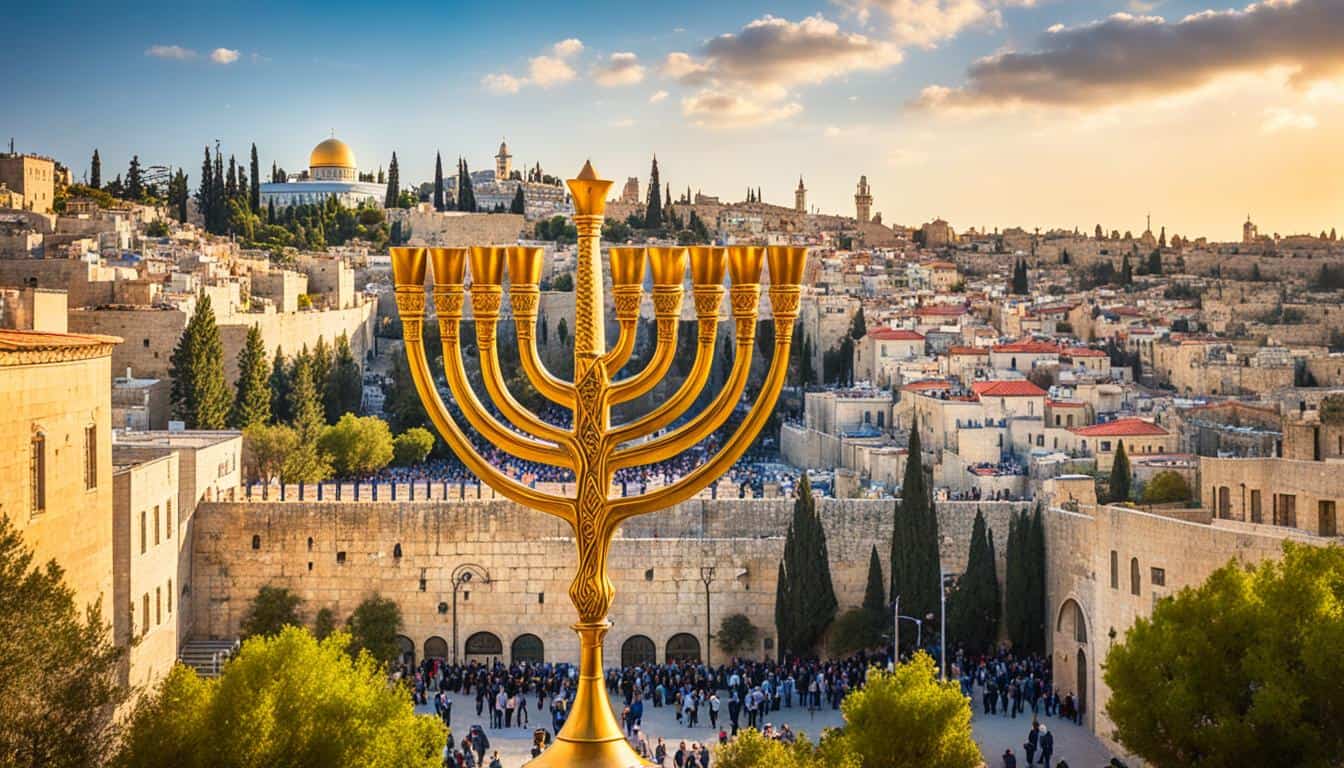Table of Contents
Have you ever thought about Zion and the Torah’s link in Jerusalem?
How does the Torah shape this city’s biblical tradition?
We will uncover Zion’s importance in Jerusalem in this article. We’ll see how Zion shows God’s presence in the Old Testament. We’ll also see how the Law given to Moses is highly valued in the city’s culture.
But, how do these elements connect?
How does Jesus, key to the Christian faith, fulfill the Law valued by Jerusalem’s people?
Join our journey to explore Zion and the Law’s rich history and traditions. Learn about the spiritual insights and prophecies about the Messiah’s coming. See how Jesus’ teachings and sacrifice complete Jerusalem’s cultural fabric.
Get ready to explore the deep links between Zion, the Law, and Jerusalem’s culture.
The Significance of Zion in Biblical Tradition
Zion is very important in the Bible. It’s more than just a place. It’s a sign of God’s presence and His promises. When we look into how Zion is talked about in the Bible, we learn more about its spiritual meaning. We also see how it connects to Jesus’s coming.
The Dwelling Place of God
In Psalm 132:13-14, there’s a special view of Zion:
“For the Lord hath chosen Zion; he hath desired it for his habitation. This is my rest forever: here will I dwell; for I have desired it.”
This verse shows us how unique Zion is to God. It’s His chosen home and a place of rest. Zion isn’t just a city but a spiritual home where we can feel God’s presence.
Prefiguring the Coming of Jesus
Zion also hints at Jesus’s arrival. In the Old Testament, it’s linked with the Messiah’s future reign and His eternal kingdom.
Looking through the Bible, we see Jesus as the promised Messiah of Zion. He brings us salvation and starts His never-ending kingdom. His life, death, and resurrection start a new time of redemption. This fulfills the promises linked to Zion.
Understanding Zion’s role in the Bible helps us see the deep links between Old Testament prophecies and Jesus’s work. It shows us God’s plan for saving us. It also underlines how important Zion is as a sign of God’s presence and His promises kept.
Jesus and the Fulfillment of the Mosaic Law
In Jerusalem, people greatly respected the Mosaic Law. It was a big part of their daily life. Jesus played a key role in completing this aspect of the city’s religious scene.
Matthew 5:17-18 tells us Jesus valued the Law and did not come to end it. He said, “Think not that I am come to destroy the law, or the prophets: I am not come to destroy, but to fulfil. For verily I say unto you, Till heaven and earth pass, one jot or one tittle shall in no wise pass from the law, till all be fulfilled.”
Jesus taught that He wasn’t dismissing the Mosaic Law’s importance. Instead, He brought a deeper meaning and completion to it. Through what He taught and did, He showed love, compassion, and grace were key.
Jesus went beyond just following the Law’s rules. He captured its true spirit and goal. He taught Jerusalem and others how to practice God’s principles.
Jesus embraced the Law’s core principles. He taught about being righteous, merciful, fair, and faithful. He stressed changing from within more than just following rituals.
Jesus changing the Law’s meaning had a big effect in Jerusalem. It challenged their views on being righteous and showed them a new way dedicating their lives to God. This opened the path to a new covenant based on grace and forgiveness.
Contrasting the Mosaic Law and Jesus’ Fulfillment
| Mosaic Law | Jesus’ Fulfillment |
|---|---|
| Emphasis on external obedience | Focus on internal transformation |
| Strict adherence to ritualistic practices | Emphasis on love, compassion, and grace |
| Commandments based on fear and punishment | Teachings rooted in love and forgiveness |
| Temporary sacrifices and atonements | Ultimate sacrificial offering through Jesus’ death |
| External standards of righteousness | Transformation of the heart and inner being |
Jesus brought not just a new way to see God’s rules but showed God’s constant love. He wanted a closer bond with humans. His teachings changed Jerusalem’s culture, starting Christianity’s foundations.
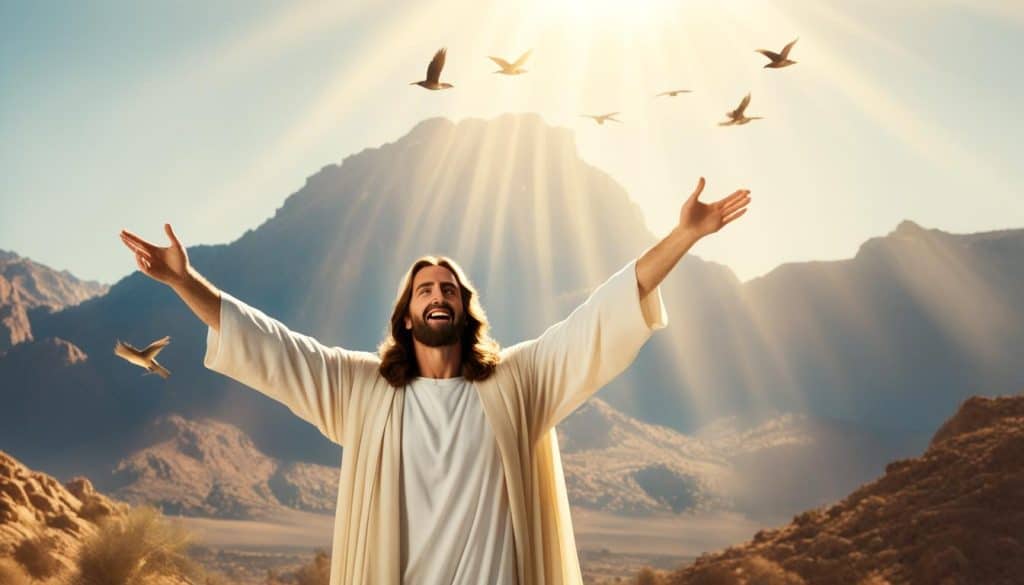
Jesus as the Ultimate Temple of God
In Jerusalem, the splendid temple stood as God’s symbol among His people. Its grand architecture spoke of devotion and was central to Jewish worship. It was a bridge between humans and God.
The temple’s concept goes deeper than its stones. It’s about God living among His people, in their hearts and lives. Jesus Christ fulfills this idea perfectly.
Jesus made a bold statement that confused many. In John 2:19-21, He said, “Destroy this temple, and in three days I will raise it up.” People thought He meant the stone temple. But Jesus hinted at something more profound.
Jesus meant He was the ultimate temple, where God lives among us.
Like the temple connected God and people, Jesus linked us back to God. He came as a man to be with us. He showed God’s presence the temple symbolized.
Jesus opened a new way to God’s presence through His actions. Worship isn’t about a place; it’s where believers are. In Matthew 18:20, He said, “For where two or three gather in my name, there I am with them.”
Jesus became God’s ultimate dwelling by His life, death, and resurrection. We don’t need to visit a special place to find Him. He’s always with us, ready to enter our hearts and change us.
The Jerusalem temple is historically important. Yet, Jesus is the true temple where God dwells. With Him, we have a direct, life-changing connection to the divine. We’re not bound by location or buildings.
Passover in Jerusalem: Foreshadowing the Lamb of God
The Passover in Jerusalem is pivotal in the Bible. It predicts Jesus’s sacrifice as the Lamb of God. This festival celebrates freeing the Israelites from Egyptian slavery, as the book of Exodus tells us.
In Passover, Jerusalem comes alive with people from all places. They come to honor this holy time. Streets buzz with prayers, offerings, and rituals to respect their faith and forefathers.
The connection of Jesus as the Lamb of God shines through this bustling scene. We learn from 1 Corinthians 5:7, “For even Christ our Passover is sacrificed for us.” This links the Old Testament’s Passover lamb and Jesus’s sacrifice on the cross.
“For even Christ our Passover is sacrificed for us.” – 1 Corinthians 5:7
The Passover lamb’s blood saved the Israelites from God’s judgment. Similarly, Jesus’s death offers salvation to believers. This connection enhances the meaning of Passover in Jerusalem. It ties it to Jesus’s ultimate sacrifice.
Passover symbols and rituals all hint at Jesus as the Lamb of God. Matzah shows Jesus’s pure nature. Bitter herbs recall His suffering for us. The cup of redemption stands for His blood, offering forgiveness and everlasting life.
Believers in Jerusalem during Passover recall its profound meaning. It’s a strong reminder of the Lamb of God who sacrificed Himself for us.
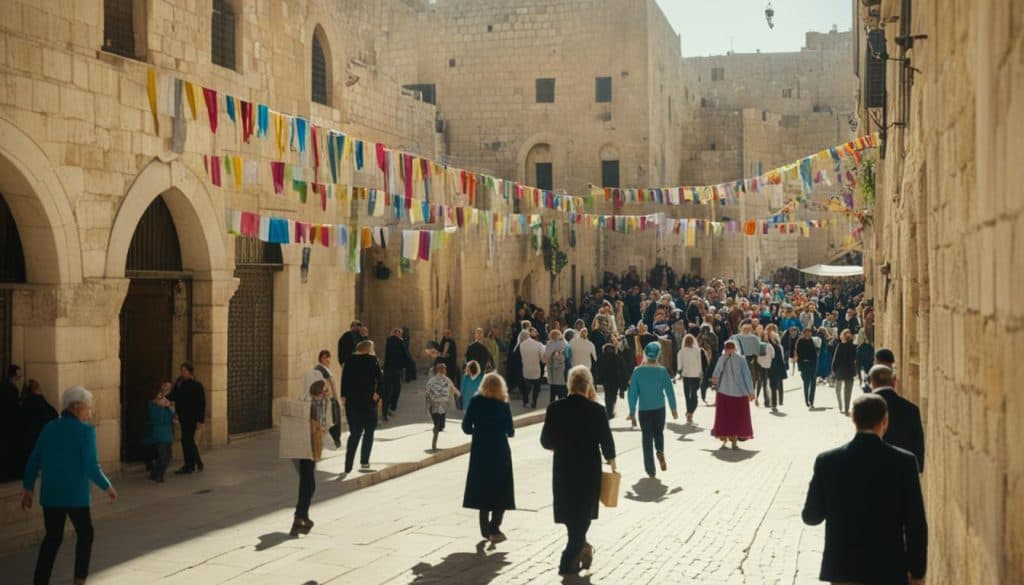
| Symbol | Meaning |
|---|---|
| Unleavened Bread | The sinless nature of Jesus |
| Bitter Herbs | The sufferings Jesus endured on our behalf |
| Cup of Redemption | Jesus’ shed blood, bringing forgiveness and eternal life |
Jesus as the Heir to David’s Throne
In the Bible, Jesus is seen as the successor to David’s throne. This fulfills the old Psalms’ prophecies, setting up a kingdom forever. This royal lineage is confirmed in Luke 1:32-33, stating:
“He shall be great, and shall be called the Son of the Highest: and the Lord God shall give unto him the throne of his father David: And he shall reign over the house of Jacob forever; and of his kingdom there shall be no end.”
These words show Jesus’ royal power. They declare him as the promised king whose rule goes beyond time. His lineage is traced back to King David, proving His claim to David’s throne.
As David’s heir, Jesus meets the Psalms’ predictions and starts an everlasting kingdom. This kingdom is different from earthly ones that come and go. It will last forever, with Jesus as its permanent ruler.
The role of Jesus as David’s heir and the founder of an eternal kingdom means a lot to believers. It shows that old prophecies came true and promises a future beyond this life.
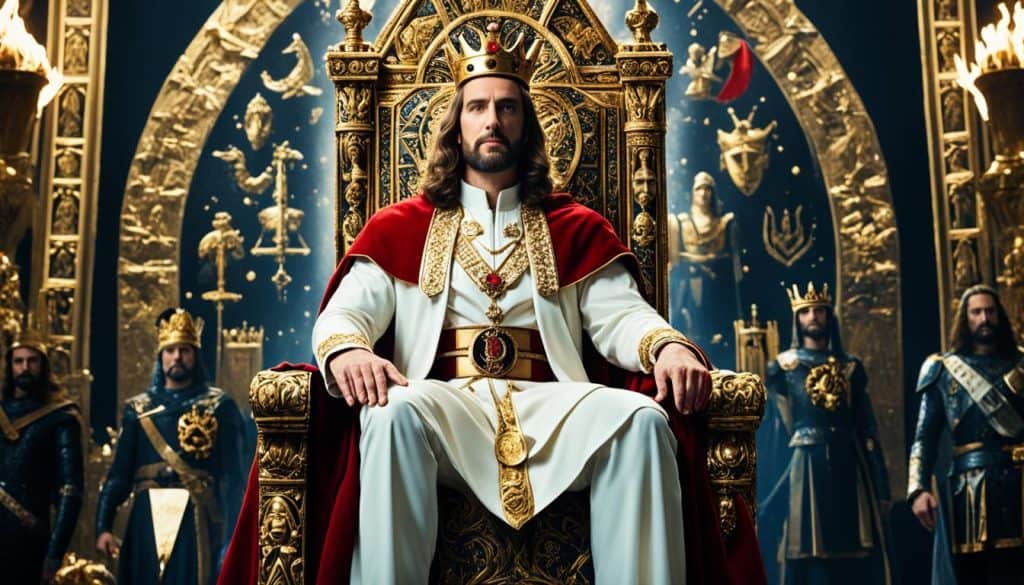
Comparison of Earthly Kingdoms and Jesus’ Eternal Kingdom
| Earthly Kingdoms | Jesus’ Eternal Kingdom |
|---|---|
| Subject to change | Enduring and everlasting |
| Ruled by human kings | Ruled by Jesus, the eternal king |
| Temporarily dominant | Ultimate and supreme |
| Flawed and imperfect | Perfect and righteous |
| Transient power | Unshakable and eternal power |
| Subject to decay and destruction | Indestructible and everlasting |
Prophetic Visions of Zion and the Coming of the Messiah
In the Old Testament, we find prophecies about the Messiah and Zion. These visions show God’s future plans and His promises. They make us look forward to what’s to come.
Isaiah 2:2-4 shares a vision:
And it shall come to pass in the last days, that the mountain of the Lord’s house shall be established in the top of the mountains, and shall be exalted above the hills; and all nations shall flow unto it. And many people shall go and say, Come ye, and let us go up to the mountain of the Lord, to the house of the God of Jacob; and he will teach us of his ways, and we will walk in his paths: for out of Zion shall go forth the law, and the word of the Lord from Jerusalem. And he shall judge among the nations, and shall rebuke many people: and they shall beat their swords into plowshares, and their spears into pruninghooks: nation shall not lift up sword against nation, neither shall they learn war any more.
Zion is shown as the Lord’s mountain, higher than any other. People from all over come here for spiritual wisdom. From Zion flows God’s law and word, offering guidance to everyone.
This vision predicts Jesus’ arrival as a great teacher and judge. His words would start in Zion and Jerusalem, spreading peace and unity. Wars and conflicts would end as His message takes hold.

These visions fill us with hope for Jesus, the Messiah’s coming. He will start God’s kingdom, a time of peace and goodness. They remind us of God’s promise and His plan for redemption.
Jesus as the Great High Priest
In Jerusalem’s temple, the high priest played a crucial role. They connected people to God and guided their worship. We’ll look at how this role links to Jesus as the ultimate high priest.
Jesus stands as the perfect link between God and us. Hebrews 4:14-15 shows He is the “great high priest” with divine authority.
“Seeing then that we have a great high priest that is passed into the heavens, Jesus the Son of God, let us hold fast our profession. For we have not an high priest which cannot be touched with the feeling of our infirmities; but was in all points tempted like as we are, yet without sin.”
Jesus did more than any high priest by offering Himself for us. He became the ultimate sacrifice for our sins.
Jesus feels our weaknesses and stands by us. He knows what temptation is like because He faced it, too.
His death and return to life mean we’re forgiven forever. Jesus is our permanent advocate before God.
Understanding Jesus as the great high priest matters a lot. His work offers us hope, mending our bond with God forever.
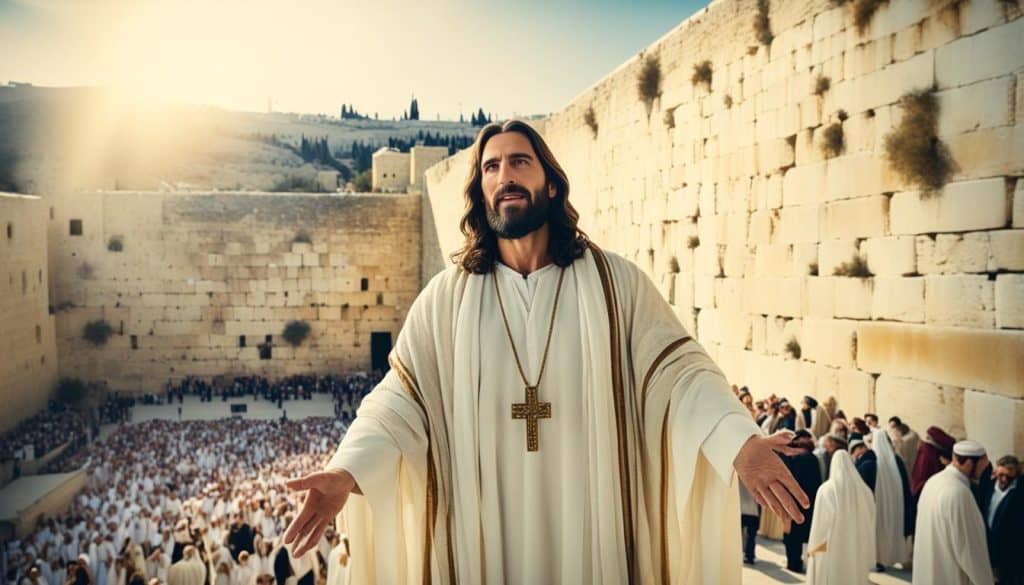
Key points:
- Jesus goes beyond the high priest’s duties in Jerusalem’s temple.
- He is called the great high priest in Hebrews 4:14-15.
- Jesus sacrificed Himself for everyone’s redemption.
- He knows our struggles and speaks to God for us.
- Jesus ensures we are always forgiven and connected to God.
- His ministry is bigger than any temple rituals.
How Does Music and Worship in Jerusalem Relate to the Importance of Torah in Jerusalem’s Culture?
Music and worship in Jerusalem play a significant role in the city’s culture, reflecting the importance of Torah. Zion’s songs are often used in worship to connect with the spiritual significance of Jerusalem and the teachings of Torah. This connection reflects the integral role of music and worship in reinforcing the cultural importance of Torah in Jerusalem.
Jerusalem’s Festivals and Jesus’ Teachings
Jerusalem’s cultural and religious heritage is rich. Jesus used these festivals to share deep teachings about His mission and who He is. He connected deeply with people through the meaning of these events.
At the Feast of Tabernacles, Jesus spoke powerful words. “If any man thirst, let him come onto me, and drink. He that believeth on me, as the scripture hath said, out of his belly shall flow rivers of living water” (John 7:37-38 KJV). This message was linked to the festival’s tradition of water being poured on the altar.
Jesus taught during these times to reveal His nature and mission. He showed He is the source of living water, offering eternal life to believers. This challenged the existing religious practices and offered people a new understanding of salvation.
By linking His teachings to Jerusalem’s cultural events, Jesus shared new insights. He showed His authority as the Son of God. His words amazed many, showing the depth of His mission and who He is.

